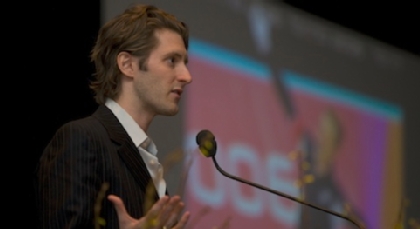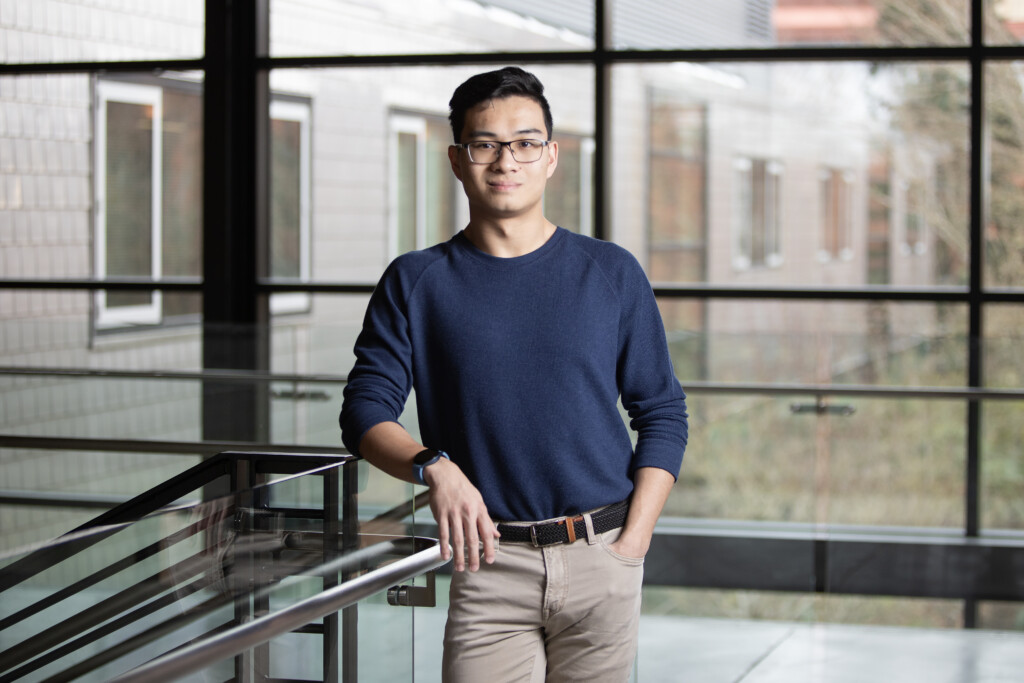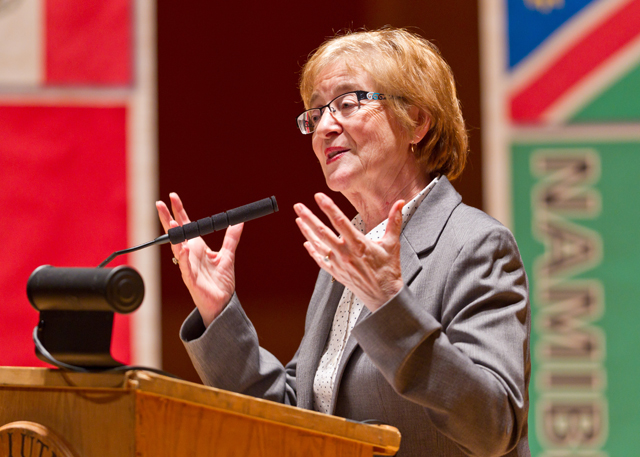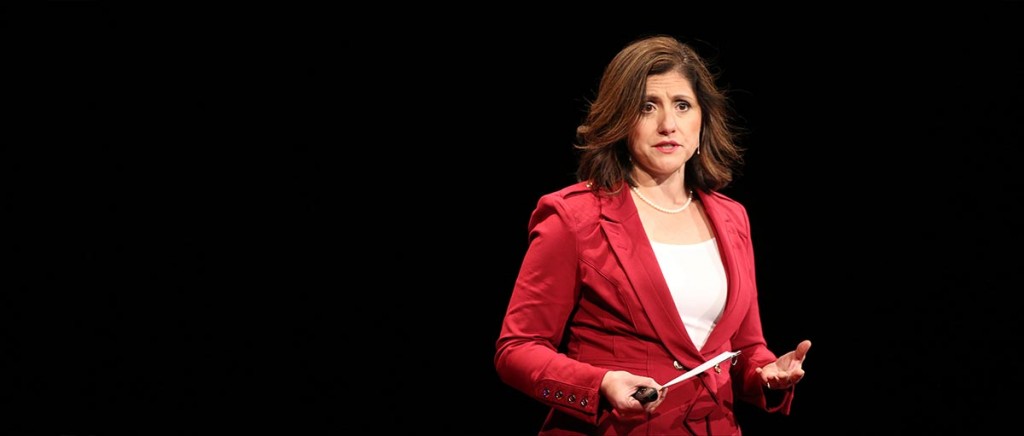Page 13 • (1,096 results in 0.029 seconds)
-

Olympic medalist encourages symposium crowd to make a difference By Barbara Clements Joey Cheek was sprawled out on a couch in 2005, wondering what he was going to do with a free afternoon after training all morning in an Austrian skating facility, when a BBC…
Princeton University, where he enrolled in 2007, and is studying economics. But his passions still lie with helping the people of Darfur and with humanitarian issues. That has not always gone over well with authorities in countries where human rights has been an ongoing issue. Just days before the Opening Ceremonies of the 2008 Beijing Games – the Chinese Embassy in Washington contacted Cheek to inform him that his previously issued visa was revoked. Cheek planned to attend the Games to support the more
-

Meet Brian Sung, a business major from the class of ’24 at PLU. When he’s not taking international honors courses or diving deep into his double majors in business and economics , he’s all about data science and statistics through his double minors. Outside of…
am not a human calculator. When I took my first finance class, the professor told me I should do finance. I took a couple more advanced finance classes and went, “I want to do finance.”When did you add the double major in economics? I was taking economics courses for my business degree, and Dr. Priscilla St. Clair—huge shoutout to her—pushed me to think about how humans make choices. I thought that intersected with business, and I enjoyed looking at the intersectionality between data and
-

The book has a long history as a rich vessel for stories of the human condition. Amontaine Aurore and Kimisha Turner present their artists’ book “ Reverie, and other projects” . They will be joined by book artist, Carletta Carrington Wilson for this riveting exhibition…
Race & Personal Narrative Exhibition Posted by: Kate Williams / February 22, 2019 February 22, 2019 By Kate Williams '16The book has a long history as a rich vessel for stories of the human condition. Amontaine Aurore and Kimisha Turner present their artists’ book “Reverie, and other projects”. They will be joined by book artist, Carletta Carrington Wilson for this riveting exhibitionSeattle based artist Kimisha Turner creates multifaceted work tapping self reflection and empowerment, while
-

Maude Barlow – National Chairperson of the Council of Canadians and chair of the board of D.C.-based Food and Water Watch – delivers the keynote address opening the Wang Symposium, “Our Thirsty Planet”on Feb. 23 at PLU. (Photo by John Froschauer) ‘Water is the great…
world markets and being used in third world countries, so developed countries do not have to bear the burden of contamination, exploitation and overuse. It is becoming a privatized commodity. Barlow told symposium attendees of struggles in Bolivia, where corporations purchased water rights and sold access to water to who could pay, she said. The struggle centered on access to clean water to live as a basic human right. She recalled what an activist told her when asked why fight for such a cause
-
Barr reflects on her PLU education, work overseas Career diplomat Joyce Barr ’76 spoke to the Class of 2008 and their families during Spring Commencement on May 25 at the Tacoma Dome. The following is the text of her speech: Chair Gomulkiewicz, President Anderson, Provost…
States as well. I was a Recruitment Officer, worked on Human Rights issues, with International Organizations, and I spent one year on Capitol Hill working first for a Senator and then for a Congressman. I also spent an academic year at Harvard University and another at the National Defense University at Fort McNair in Washington D.C. I am currently stationed in Washington DC working for the second time in the Bureau of East Asia and Pacific Affairs. The “Asian Century” and China’s Rise I think this
-

TACOMA, WASH. (Jan. 10, 2019) — For student-athletes, loaded down with team meetings, practices and weight room, transitioning from high school classes to collegiate course loads can be challenging. But PLU football coach Brant McAdams believes it doesn’t have to be that way. That’s why…
on board. So he worked out a plan with Dr. Frey and Director of Student Rights and Responsibilities Connie Gardner to co-teach the class, with one of his senior football players and captains, Anthony Louthan, serving as a peer co-instructor. “(You’ve) got Anthony, so now we have a peer for them, not just as a college student but also as this other (football) identity,” Dr. Frey said. “You’ve got Connie and I, who are excited to work with this group.You’ve got the head football coach who wants to
-
Washington State University’s College of Agriculture, Human, and Natural Resources and the WSU Food Systems Program, proudly present the Research and Extension Experiences for Undergraduates Internship (REEU), a unique opportunity for students interested in careers in food systems. Selected undergraduate fellows will be paired with…
Food Systems Summer Research at WSU Posted by: nicolacs / February 14, 2019 February 14, 2019 Washington State University’s College of Agriculture, Human, and Natural Resources and the WSU Food Systems Program, proudly present the Research and Extension Experiences for Undergraduates Internship (REEU), a unique opportunity for students interested in careers in food systems. Selected undergraduate fellows will be paired with a WSU Faculty mentor for a 10 week summer internship. Participants will
-

A master’s degree in Kinesiology will enhance the skill set of novice and experienced practitioners in exercise, sport, performance and health related careers. Let’s look into some kinesiology careers you can choose from. Kinesiology is the science of human movement . Kinesiology studies the principles…
What Can You Do with a Master’s in Kinesiology? (11 Kinesiology Careers to Choose From) Posted by: chaconac / September 15, 2021 September 15, 2021 A master’s degree in Kinesiology will enhance the skill set of novice and experienced practitioners in exercise, sport, performance and health related careers. Let’s look into some kinesiology careers you can choose from.Kinesiology is the science of human movement. Kinesiology studies the principles of movement and investigates the complexity of
-
Matters of Faith By Patricia O’Connell Killen, Ph.D. Provost and Dean of Graduate Studies Professor of Religion At PLU, students talk about spirituality. They think about the meaning of life – human experiences of love, joy, creativity, success, suffering, death, of making and keeping commitments,…
June 16, 2009 Matters of Faith By Patricia O’Connell Killen, Ph.D. Provost and Dean of Graduate Studies Professor of Religion At PLU, students talk about spirituality. They think about the meaning of life – human experiences of love, joy, creativity, success, suffering, death, of making and keeping commitments, of extending oneself on behalf of others. Students grapple with the meaning of integrity. They seek to find a purpose, something that is, in the words of some of my former students
-

TACOMA, WASH. (March. 13, 2016)- TEDxTacoma 2016: Healthy Future will welcome a diverse bill of local business, arts, education and nonprofit leaders to share their ideas on a wide spectrum of topics including health care, leadership, human nature and violence against women. The annual event…
business, arts, education and nonprofit leaders to share their ideas on a wide spectrum of topics including health care, leadership, human nature and violence against women. The annual event will be held April 22 at 7 p.m. at Pacific Lutheran University’s Karen Hille Phillips Center for the Performing Arts.Now in its fifth year, TEDxTacoma provides a platform for the exchange of creative and often paradigm-challenging ideas about how thoughtful, action-oriented individuals can contribute to positively
Do you have any feedback for us? If so, feel free to use our Feedback Form.


